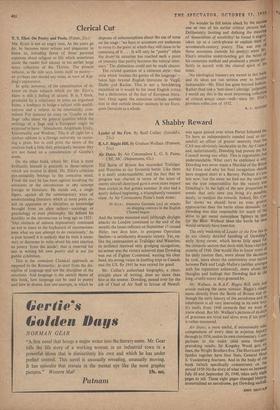Clerical Cut
T. S. Eliot: On Poetry and Poets. (Faber, 21s.) - MR. ELIOT is not an angry man. As the years go by, he becomes more urbane and pleasanter to listen to, intruding fewer of those personal opinions about religion or life which sometimes made the reader feel uneasy in his earlier _large essay collection of the Thirties. The present volume, as the title says, limits itself to poetry— or perhaps one should say verse, in view of Kip- ling's appearance.
In spite, however, of the concentration of in- terest on those subjects which are Mr. Eliot's, t here is still a feeling of unease. it is, I think, produced by a reluctance to press an argument home, a tendency to hedge a subject with qualifi- cations and a refusal to be emotionally com- mitted. For instance an essay on 'Goethe as the Sage' talks about the general qualities which the writings of a Sage and a European might be expected to have : 'Abundance, Amplitude, Unity, Universality and Wisdom..' This is all right for a spoken address to a foreign university on receiv- ing a prize, but in cold print the terms of the analysis look a little thin, principally because they are not based on a consideration of Goethe's work.
On the other hand, where Mr. Eliot is most brilliantly himself is precisely in those-. subjects which are treated in detail. Mr. Eliot's criticism pre-eminently belongs to the conscious mind. From the start he has been against invc,eving the emotions or the unconscious or any concept foreign to literature. He stands out, a single figure, against all the contemporary ways of understanding literature which at some point en- tail an apparatus or a discipline or knowledge brought from an alien subject—sociology or psychology or even philosophy. He defined his hostility to the unconscious as long ago as 1923: Our instincts of tidiness imperatively command us not to leave to the haphazard of unconscious- mess what we can attempt to do consciously.' As a poet himself it is unlikely that he feels it neces- sary or decorous to write about his own reaction to poetry 'from the inside'; that is reserved for aise in writing his own poetry and is not for public exhibition.
This is the conscious Classical approach as opposed to the Romantic: to start from the dis- cipline of language and not the discipline of the emotions. And language is the central theme of this book, how language can be used in poetry and how in drama. Just one example, in which he disposes of misconceptions about the use of verse on the state: 'we have to accustom our audiences to verse t'a the point at which they will cease to be conscious of it... . It will only be "poetry" when the dramntic situation has reached such a point of intensity that poetry becomes the natural utter- ance.' The distinction could not be made clearer.
The related question of a common style—that style which 'realises the genius of the language'— lakes him beyond English literature to Virgil, Dante and Racine. This is not a bewildering excursion as it would be for most English critics, but a declaration of the fact of European litera- ture. Once again the conscious attitude enables him to step outside insular instincts to see Euro- pean literature as a whole. No wonder he felt taken aback by the success one or two of his earlier critical phrases
Deliberately limiting and defining the meaning of 'dissociation of sensibility' he found it eagerY taken up as a catch-phrase to explain most of seventeenth-century poetry. This was one of those occasions (outside his poetry) when Mr; Eliot's intuitive understanding got the better or his conscious method and produced a phrase Per,- fectly in accord with the clinical spirit of his times. No ideological banners are waved in this book and its ideas are too serious ever to become fashionable—Mr. Eliot has gone beyond fashion. Rather than' risk a 'best since Coleridge' judgment, I would say this is the most interesting collectio.n of critical essays since—well—since Mr. Eliot 5 previous collec.:ion of 1932. R. L. SLEgf


































 Previous page
Previous page